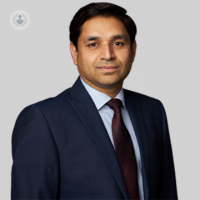Heart valve replacement: Choosing wise
Written by:Heart valve replacement surgery is a crucial step in managing various cardiac conditions. When faced with the decision to undergo this procedure, understanding the available options and considering individual factors becomes paramount. In his latest online article, Mr Vivek Srivastava aims to address common queries regarding prosthetic heart valves, including the factors influencing choice, differences between mechanical and biological valves, considerations for suitability, associated risks, and the comparative advantages and disadvantages of different types of heart valve replacements.

What factors should I consider when choosing a prosthetic valve for my heart surgery?
Selecting the appropriate prosthetic valve involves assessing several factors, including age, lifestyle, medical history, and preferences. Younger patients may opt for mechanical valves due to their longevity, while older individuals might prioritise bioprosthetic valves for reduced reliance on blood-thinning medications. Other considerations include the presence of comorbidities, anticipated longevity, and the need for future surgeries.
What are the differences between mechanical and biological heart valve replacements?
Mechanical valves are typically made of durable materials like titanium or carbon, offering longevity but necessitating lifelong anticoagulation therapy to prevent blood clots. In contrast, biological valves are derived from animal or human tissue and may not require lifelong anticoagulation. However, they have a limited lifespan and may require replacement after a certain period, particularly in younger patients.
How do I know which type of valve replacement is best suited for my medical condition and lifestyle?
Determining the most suitable valve replacement involves a comprehensive evaluation of medical condition and lifestyle factors. Patients with mechanical valves must adhere strictly to anticoagulation therapy, which may affect activities and dietary choices. Biological valves offer a more flexible lifestyle but may require earlier replacement, particularly in active individuals or those with complex medical histories. Consulting with a multidisciplinary team including cardiologists and cardiac surgeons can provide personalised recommendations.
Are there any risks or complications associated with specific types of heart valve prostheses?
Both mechanical and biological valves pose certain risks and complications. Mechanical valves carry a higher risk of thromboembolism and bleeding due to anticoagulation therapy, while biological valves may degenerate over time, leading to structural deterioration or valve dysfunction. Additionally, there are risks associated with the surgical procedure itself, including infection, bleeding, and prosthetic valve failure.
Can you explain the advantages and disadvantages of different types of heart valve replacements in terms of durability, functionality, and long-term outcomes?
In terms of durability, mechanical valves are known for their longevity and resilience to wear and tear, offering lasting functionality. However, they require lifelong anticoagulation, increasing the risk of bleeding complications. Biological valves, while not requiring lifelong anticoagulation, have a limited lifespan and may necessitate repeat surgeries. The choice between these options involves weighing the trade-offs between durability, medication requirements, and long-term outcomes.
Mr Vivek Srivastava is an esteemed cardiothoracic surgeon. You can schedule an appointment with Mr Srivastava on his Top Doctors profile.


